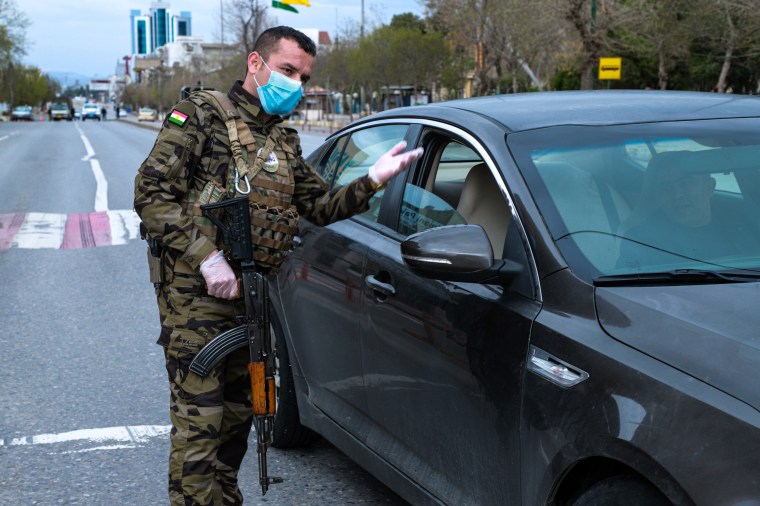New York, February 1, 2021 – Iraqi Kurdish security forces should immediately release photojournalist Qaraman Shukri and cease harassing members of the press, the Committee to Protect Journalists said today.
At about 8:30 a.m. on January 27, Asayish security forces affiliated with Iraqi Kurdistan’s ruling Democratic Party of Kurdistan arrested Shukri at his home in Shilazdeh, a village near the region’s western city of Duhok, according to news reports, the journalist’s uncle Shakr Zainadin, his brother Zeravan Shukri Zainadin, and Ayhan Saeed, the Duhok representative of the local press freedom organization the Metro Center for Journalists’ Rights and Advocacy, all of whom spoke to CPJ in phone interviews.
Shukri works as a freelance photographer, and has contributed to the news website Roj News and the broadcaster Sterk TV, which support the opposition Kurdistan People’s Party, according to those sources.
Asayish agents seized the journalist’s electronic devices during his arrest and took him to an unknown destination, according to those news reports. Shakr Zainadin told CPJ that the agents did not disclose any reason for Shukri’s arrest, and did not present a warrant or any court papers.
“Iraqi Kurdish authorities must immediately explain why they have detained journalist Qaraman Shukri, or immediately release him without charge,” said CPJ Middle East and North Africa Representative Ignacio Miguel Delgado. “Kurdish authorities in northern Iraq have a very poor track record on respecting the rights of freelance journalists, and with this latest arrest, it seems that they are not moving in the right direction.”
Shakr Zainadin told CPJ that the Asayish agents arrived in seven or eight cars, and that most of them wore full face masks.
Zeravan Shukri Zainadin said that the agents handcuffed Shukri and shoved the journalist’s mother during the raid. He said the agents “seized every electronic device they could find in the house, including cell phones, computers, and the kids’ tablets.”
“They subsequently broke into our [camera] store and seized all the cameras and the computers we use for work. They took hard drives containing footage of weddings,” he added.
Zeravan Shukri Zainadin said that he and Shukri often film weddings and other social events, and that he believed his brother had recently filmed protests against Turkish airstrikes and over public servants’ unpaid salaries, which have taken place in the area.
“He always carries a camera with him and he would film the protests that have taken place here and send the footage for publication to broadcasters,” he said. “I think the authorities were very unhappy about this and that’s why he has been arrested.”
Zeravan also said that he did not know where his brother was held, but that it was possible he is detained at the Asayish facility in Duhok, the closest large city.
Saeed told CPJ via messaging app today that Shukri’s whereabouts remain unknown. He speculated that the arrest may have been prompted by a post on Shukri’s personal Facebook account, which CPJ reviewed but which has since been taken down, which included a statement by the co-chairman of the opposition Patriotic Union of Kurdistan party.
In late June 2020, Shukri was arrested at his home by Asayish security forces and was imprisoned for nearly five months, according to CPJ research and news reports.
On February 9, after the publication of this article, Dindar Zebari, the Kurdistan regional government’s international advocacy coordinator, responded to CPJ’s emailed request for comment on Shukri’s arrest.
Zebari said that a Duhok-based investigative judge issued an arrest warrant for Shukri on January 27, which accused him of violating Article 156 of the Iraqi penal code, a clause stating that any person who commits an act intending to violate the independence, unity, or security of the country can be punished with life imprisonment.
The warrant alleges that Shukri provided sensitive information about political, military, and administrative personnel to militants affiliated with the Kurdistan Workers’ Party, a political party active in the region; Zebari said the case is related to a 2020 case involving Shukri’s alleged connections to that party.
According to Zebari, Shukri signed a preliminary statement regarding the case in the presence of a lawyer. Zebari did not disclose where Skukri is being held.
At least two Iraqi Kurdish freelancers, Sherwan Amin Sherwani and Omed Haji Barosky, were imprisoned for their work in Iraqi Kurdistan at the time of CPJ’s 2020 prison census.
[Editors’ Note: This article has been updated to include Zebari’s response to CPJ.]
